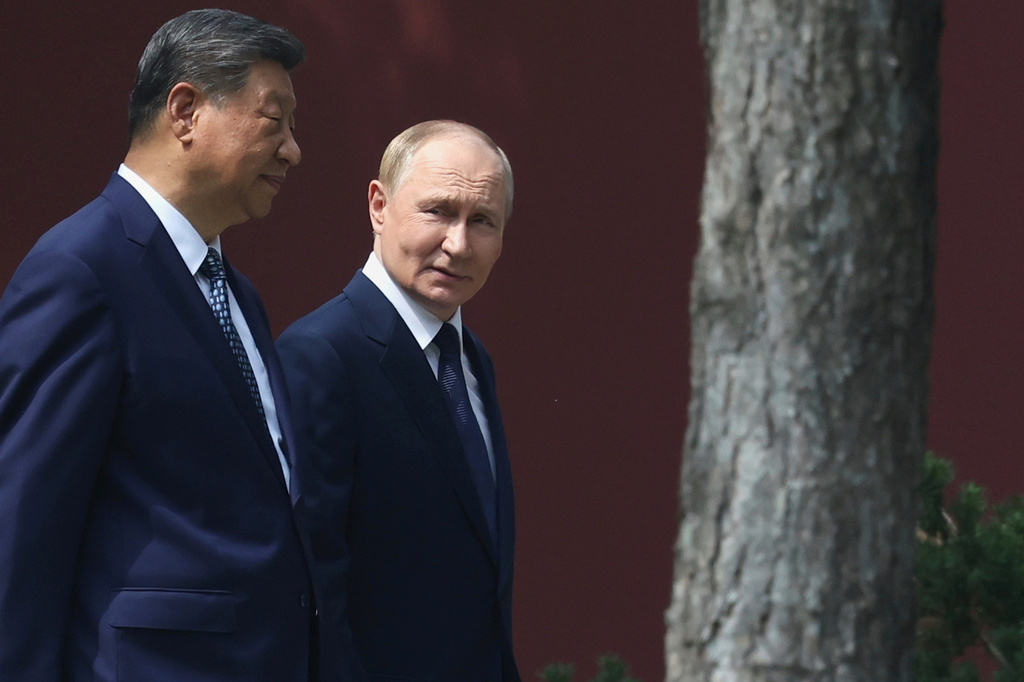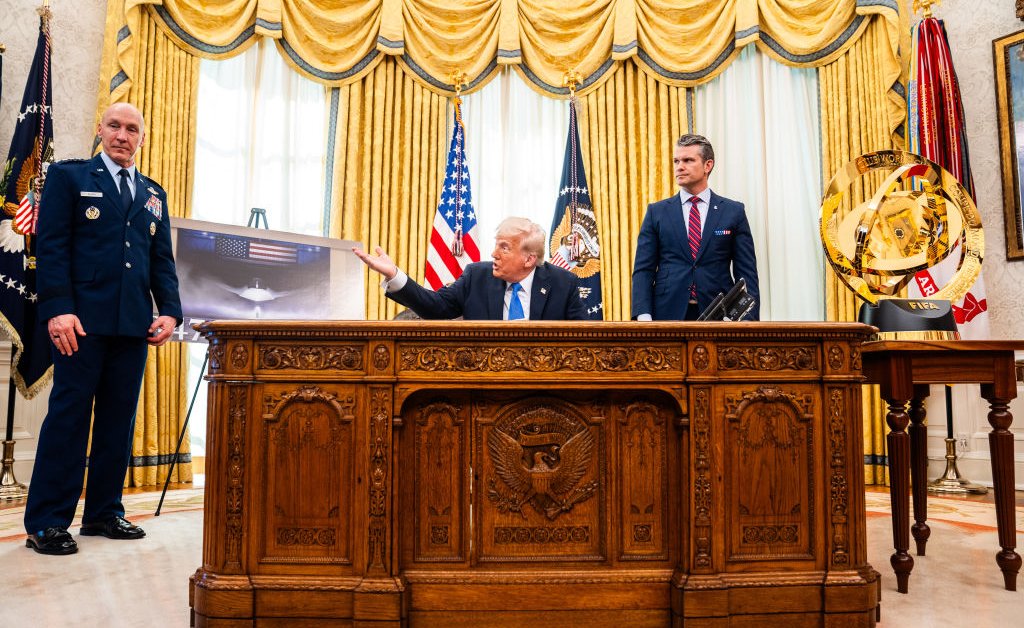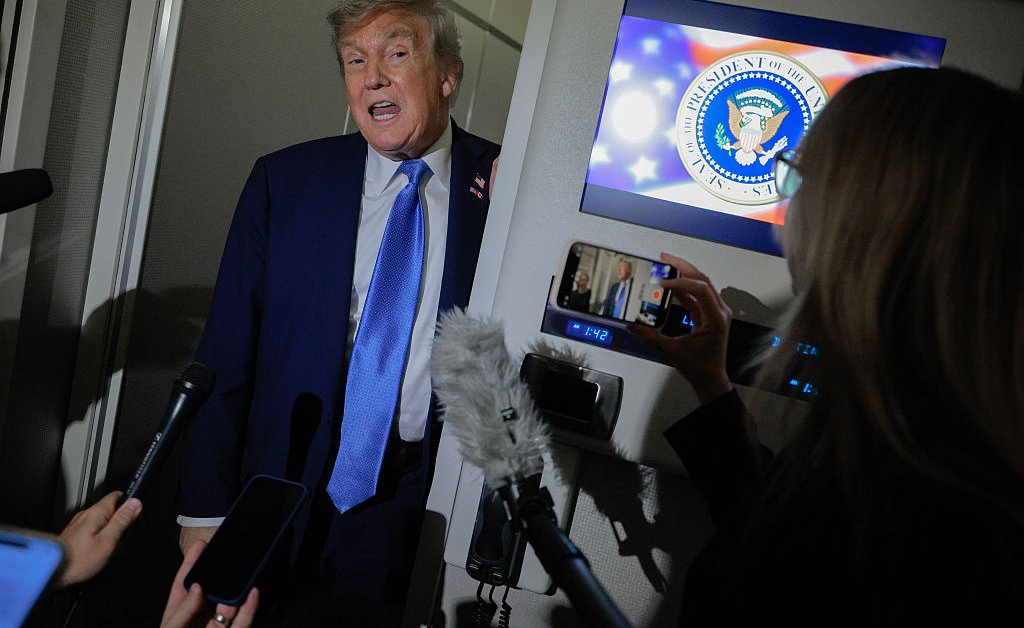
While questions swirl about the health of America’s 79-year-old President, who has openly pondered whether he’ll get to heaven, China’s Xi Jinping and Russia’s Vladimir Putin, both 72, were caught Wednesday discussing living longer, and possibly, forever.
[time-brightcove not-tgx=”true”]
In a hot mic moment livestreamed by Chinese state broadcaster CCTV during a major military parade in Beijing, the two leaders, who have each brushed past previous term limits to hold on to power in their respective countries, bantered about longevity and the potential for medical advancements.
“In the past, we used to say that very rarely people lived to 70, but these days at 70 years old you’re still a child,” a Russian translator of Xi could be heard telling Putin.
“In a few years, with the development of biotechnology, human organs can be constantly transplanted so that people can live younger and younger, and even become immortal,” Putin responded, according to a Chinese translator.
Xi then predicted: “In this century, humans may live to 150 years old.”
Putin later confirmed the conversation at a news conference with Russian reporters, saying that “modern means of health support, medicine, and even some surgeries involving organ transplants allow humanity to hope that the active lifespan will not be like today. It differs from country to country, but there’s hope that our lifespan can increase considerably.”
Here’s what to know about Russia’s and China’s investments in anti-aging.
Russia’s obsession
Putin has a “particularly acute” fear of death, Peter Pomerantsev, a senior fellow at Johns Hopkins University’s SNF Agora Institute, wrote for TIME in 2022.
While there have been unsubstantiated rumors over the years that he has cancer or Parkinson’s disease, the Russian President who is serving his record-breaking fifth term is said to be paranoid about his personal health, reportedly even bathing in Siberian red deer’s blood and subjecting visitors to two-week quarantines to avoid bringing him disease.
His government has also invested heavily in anti-aging research, including via Putin’s eldest daughter, endocrinologist Maria Vorontsova, who has received multi-million grants for her studies into cellular aging and longevity. When the U.S. issued sanctions against Putin’s children in 2022, the Treasury described Vorontsova as someone who “leads state-funded programs that have received billions of dollars from the Kremlin toward genetics research and are personally overseen by Putin.”
Last year, Putin called for a “national project” to “preserve the health” of the country. The result was the New Technologies for Health Preservation program, which has the goal to “increase the efficiency and effectiveness of medical research and development” in several areas, including “regenerative biomedicine, preventive medicine technologies, ensuring active and healthy longevity.” State-run TASS said about 210 billion Russian rubles ($2.6 billion) will be poured into the project through 2030.
Independent Russian news outlet Meduza reported that Mikhail Kovalchuk, who is a close friend of Putin and is “obsessed with immortality and the ‘Russian genome,’” lobbied for the project. Kovalchuk oversees Russia’s genetic research program where Vorontsova works.
Russia’s Health Ministry reportedly asked researchers in a June 2024 letter to provide “proposals for developments” in several longevity-related research areas, including cellular aging, bioprinting and organ printing, and even “correcting” the immune system based on “critical markers identified in the aging process.” One unnamed doctor described to Meduza the apparent urgency of the project: “They asked us to fast-track all of our proposals—it felt like the letter had just arrived today and the deadline was yesterday. To be honest, it was the first time I’d seen anything like it.”
Bioprinting, which Putin seemed to reference to Xi, faces ethical and legal concerns, but Russia has ramped up its investment in it. Rosatom, the state corporation that specializes in nuclear energy but also oversees organ-printing, previously said it hopes to master organ-printing by 2030, including producing blood vessels or even livers. Russian newspaper Kommersant reported in 2023 that the government had spent 57.3 million rubles (almost $700,000) on bioprinters and bioinks, a 47-fold increase from five years prior.
The Russian private sector is also making strides in anti-aging technology and chasing immortality: a 3D printing startup in Skolkovo implanted a 3D-printed thyroid gland into a mouse in 2015 and became the first to create live tissue in space in 2018—as part of a drive towards printing organs for humans. And Russian billionaire Dmitry Itskov founded the 2045 Initiative, a life-extension project that envisions uploading human consciousness into computer avatars.
China’s research
While less obsessed with immortality than Putin’s government, Xi’s China has also invested in aging research, as the country has the world’s largest elderly population.
In 2016, the Chinese government launched the Major Program on Organ Aging and Degeneration, an initiative focused on studying cellular and molecular mechanisms of aging. And the state-funded Chinese Academy of Sciences published studies last year and this year on reversing aging in primates.
Is the U.S. falling behind?
Historically, there’s been concern in the U.S. that China would take the lead in biotechnological advancements. “Currently, the U.S. government has no cohesive, intentional biotechnology strategy,” said the U.S. National Security Commission on Emerging Biotechnology in April, “while China is gaining ground thanks to its aggressive and carefully coordinated state-led initiatives.”
But the Wall Street Journal reported in January that longevity researchers, entrepreneurs, and enthusiasts were hopeful that President Donald Trump’s second-term Administration would put more focus and funding into the once-fringe field.
“The science around aging,” James Peyer, chief executive of longevity biotech Cambrian Bio and board director of a longevity biotechnology nonprofit, told the Journal, “has hit a tipping point where it’s too big and too exciting for any government to ignore.”








